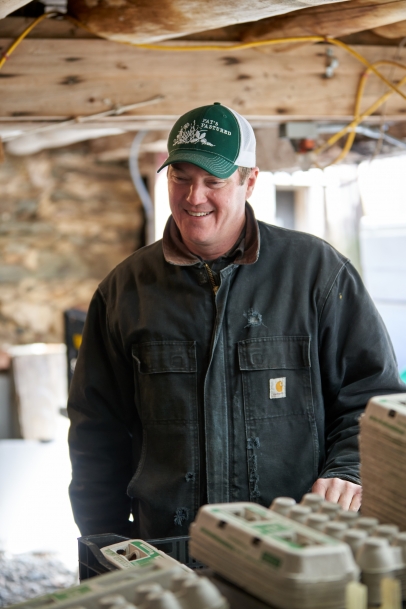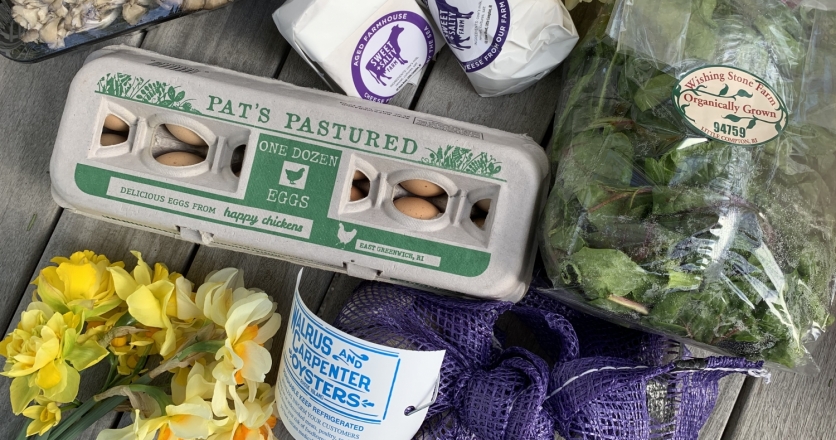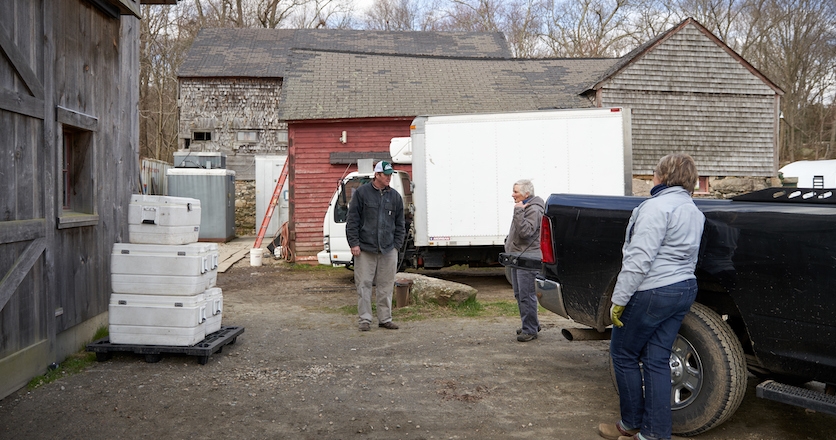Local Farmers Act Fast to Meet the Current Crisis
Zoom—everyone is on it these days—even your local farmers.
In recent weeks, a collection of farmer friends who live around the state have been getting together—virtually, of course—and devising a plan to do what they do best: provide fresh, local foods and flowers to their Rhode Island community.
So far, that plan has taken the form of a collaborative delivery service that has been overwhelmingly successful. In the past three weeks, hundreds of people have ordered meat, eggs, seafood, cheese, mushrooms, veggies, coffee and fresh florals from their favorite farmers, who in turn deliver these items directly to their door.
These efforts have not only satisfied many appreciative customers, but also highlight the strength, potential and importance of our local food system, especially in times of uncertainty amid a global pandemic that has most people sheltering-in-place.
Pat McNiff of Pat’s Pastured in East Greenwich said it all came together pretty quickly in response to COVID-19 reaching the Ocean State, and following a text from his friend Jules Opton-Himmel of Walrus & Carpenter Oysters in Narragansett, who was starting to feel the effects of the pandemic and asked McNiff about joining efforts with his existing home delivery service.
As restaurants shuttered around the state, Opton-Himmel lost the majority of his market and was trying to figure out how to save his remaining product. “A few weeks ago, I went from [selling] 17,000–20,000 oysters to zero,” he said by phone last week. “I had to make some changes.”
The idea of combining forces had been percolating for a while, McNiff said, but current events launched it into action sooner than anyone would have thought. He quickly looped in friends at Robin Hollow Farm in Saunderstown and Wishing Stone Farm in Little Compton, who brought in their neighbors, the cheesemakers at Sweet & Salty Farm. By the second week of delivery, New Harvest Coffee in Providence, Hillside Mushrooms in Little Compton and Hopkins Southdowns lamb purveyors in North Scituate had joined the effort.
Polly Hutchison of Robin Hollow Farm said she didn’t hesitate before joining, describing all of the involved parties as pals for whom she has much respect and infinite trust. “There are a few silver linings in this terrible thing,” she said, like working with friends and creating “an opportunity to reach customers in new ways.”
Now, those customers can head to Pat’s Pastured’s online shop and choose any items from all of the farm offerings, which will then be delivered together the following Thursday or Friday.
In the first week that this service was available, 100 people placed orders within 24 hours, which was a bit of a shock to the farmers, who said it was almost too much too soon. By the next week, they had re-grouped and were able to accommodate 200 customers, which has become the cap. “I had to become a mini Amazon overnight,” says McNiff, whose business was the only one set up with an online shop that could support this sort of service.
Laura Haverland of Sweet & Salty Farm has been able to shed light on grocery delivery operations, drawing from her experience working at Fresh Direct, New York City’s largest online grocer, for which she did marketing, strategy and logistical work for six years in a “prior life.” She said this collaborative delivery effort is giving her flashbacks: The logistics required are the same, but the scale and circumstances are very different.
“There is so much demand right now,” she said. “People are wisely choosing to stay home—which is the right decision.”
As she and her fellow farmers work to meet this demand as smoothly as possible, they are also implementing new best practices to minimize any exposure to the virus, among themselves and between farms and home kitchens.
“It’s been a learning curve to switch over to gloves,” said Silas Peckham-Paul of Wishing Stone Farm. They already had a well-established washroom, he said, but now are covering and wiping down equipment—even scales—between uses. “We changed gears pretty quick here,” he said.
McNiff emphasized that all are following their usual food safety measures, which have strict protocols, and also the guidelines for preventing spread of COVID-19, which includes wearing gloves, maintaining social distance and being extra vigilant about cleaning surfaces. From the beginning—via those Zoom calls—the group established rules to adhere to, including where transport is concerned. Items are bagged separately to prevent contamination (and smooshing), loaded onto trucks at Pat’s Pastured and grouped together upon delivery.
“We just don’t want to disappoint,” McNiff says. “No matter what, there are going to be glitches in the system, but we just want to keep people happy.” McNiff hopes the new customers they’ve gained during the crisis will stay with them in the long run.
“We’re literally making the road as we walk on it,” he added. “My hope is to build something we can continue to do going forward. ”
These sentiments were echoed by Ken Ayars, chief of the Division of Agriculture at the Rhode Island Department of Environmental Management, in a conference call for farmers and agriculture workers last week, part of a weekly check-in on news and updates related to COVID-19.
“I'm impressed by the amount of innovation happening in the state’s farming and fishing industries, especially in the form of delivery systems,” said Ayers. “[There's an] interest in local food and agriculture that I’ve never seen in my career.”
One of the ideas raised on that call, by farmers from around the state, was using some of the related federal stimulus money to support a unified food delivery system, which Ayars said he would look into and report back on.
In the meantime, the efforts by McNiff and others seek to fill a void and continue uninterrupted services to customers who need home delivery now more than ever.
Hutchinson, purveyor of fresh flowers, put it well: “It’s essential to feed our souls at this time.”







